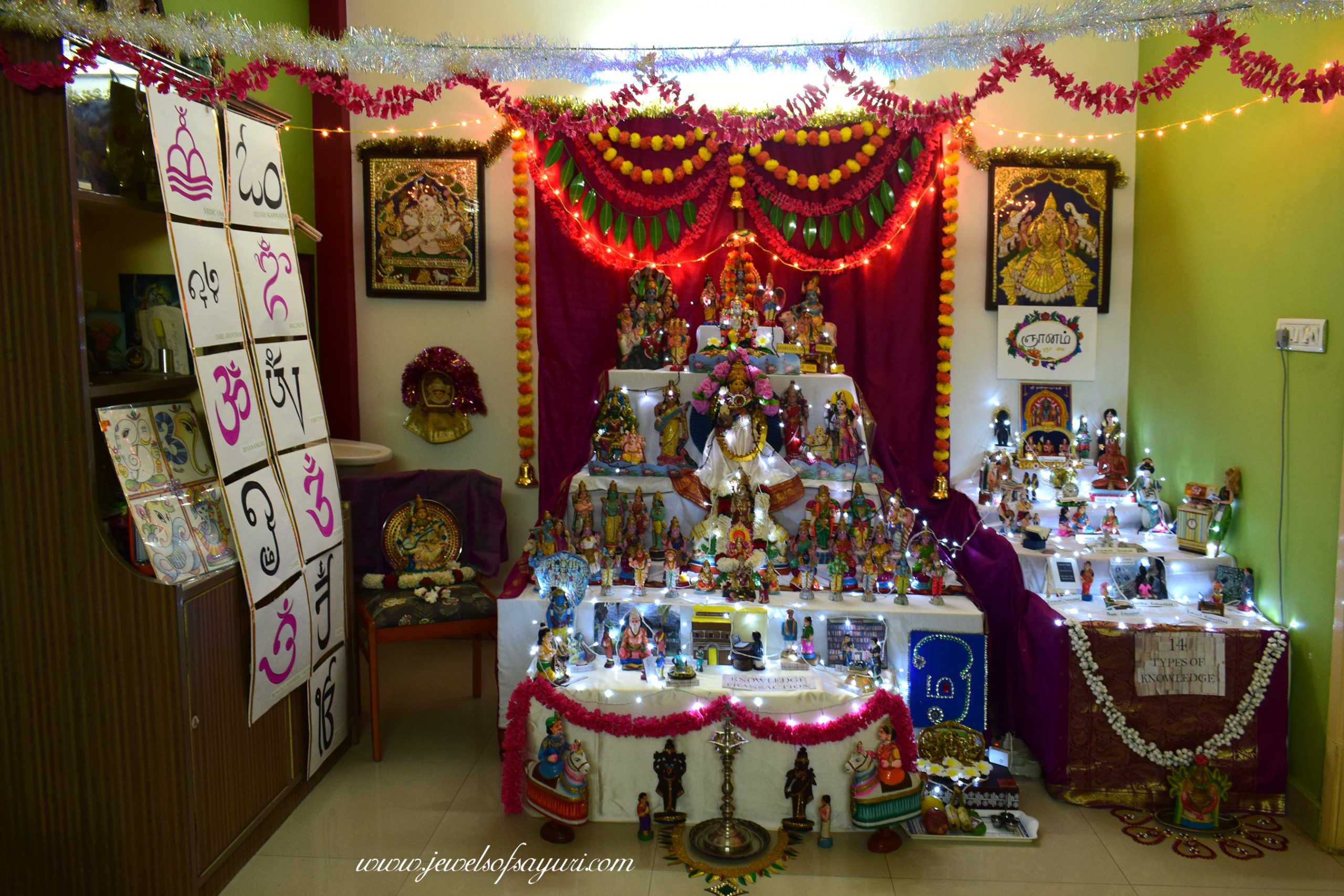Welcome to this year’s display of dolls or Navratri Golu on Knowledge (Jnanam) at my house. If you have never heard of a golu or seen one, check out my past posts on Navratri. It is a display of dolls that we put up for 10 days and nine nights. We invite people, tell stories and give gifts. At my house, we have a themed display every year. We choose themes based on both religious and social importance. This year’s theme is knowledge. We live in a world of fake news and discredited information. Furthermore, the value of true knowledge is constantly being replaced by flashy presentation and loud voices. If the last 7-8 months has shown anything, it is that ignorance leads to fear and fear causes chaos. Therefore, I felt the theme of knowledge is apt at this time.

This year’s golu is different as the viewing takes on a virtual mode through Zoom and Whatsapp video calls. Here is a visual post to add to that experience. There is a short video at the end of this post as well.
Navratri Golu on Knowledge
In a world full of chaos, knowledge brings us faith, joy and hope that we will emerge victorious. It delivers us from darkness to light. Knowledge is wealth; it is power. According to Hinduism, Goddess Saraswati and Gods such as Hayagriva, Dakshinamurti, Brahma, and Ganesha are hailed as bestowers of knowledge. Several religions believe that the primordial sound A U M contains the knowledge of the universe. We chant sounds such as AUM (OM), amen, Ameen to recollect the gift that knowledge is, to human kind.

In the Sanskrit word Jnanam, Jna means awareness and Am the self. The following are a few concepts which are related to the word Jnana. A Jnani is one who has awareness of Self. To perform Jnanayoga is to study and practice the knowledge of self which will lead to liberation. To perform Jnanayajna is to contemplate or offer knowledge in the pursuit of liberation. a simpler version of this is done by teachers everyday where were use our brain and intellect to gain and pass on knowledge to others so that they may realise their potential.

14 types of knowledge
According to western thought, there are 14 types of knowledge. They are
- A Posteriori Knowledge – knowledge which is derived from practical experiences E.g. a traveller’s lived experiences.
- A Priori Knowledge – is the assumptions that come before all the arguments, analysis or assessment E.g. a multiplication table.
- Dispersed Knowledge – It is when information is divided amongst many sources E.g. teamwork.
- Domain (Expert) Knowledge- knowledge is related to a specific field E.g. a jeweller knows about Gemology.
- Empirical Knowledge – is attained from qualitative or quantitative observations, experiments, or measurements E.g. Shakuntala Devi solving a math equation as the human computer.
- Encoded Knowledge – This type of knowledge is conveyed by symbols and signs, like books, documents, manuals, notes, and codes of practice E.g. Engineer inspecting electronic panel using a manual.
- Explicit Knowledge – The information obtained from textbooks, how-to-videos is explicit knowledge.

- Tacit Knowledge – Knowledge used for problem solving E.g King and his minister solve troubles of the kingdom using strategy.
- Metaknowledge – knowledge about knowledge and classifying it E.g. Codified texts by a guru.
- Imperative (or Procedural) Knowledge – knowledge about how to carry out tasks using specific steps E.g using a recipe to cook a meal.
- Descriptive Knowledge – Descriptive knowledge can be learned through memorization and does not require significant practical experience E.g Study of religious texts.
- Situated Knowledge – knowledge that emerges out of a specific context, community or culture E.g knowledge of Carnatic music.
- Known unknowns – we are aware that there’s something that we don’t know or understand. E.g we know that time will bring experiences many of which are unknown.
- Unknown Unknowns – knowledge that we do not have and equally are unaware that we don’t have it. E.g Children do not know what to expect of the world.
Transfer of Knowledge
Knowledge is obtained or passed on in various way. Some of them are Creator to man, ancient travelling storytellers to listeners and master to apprentice. We also learn from our parents and through self-learning whether it is by using text or experimentation. Transfer of knowledge between teacher and student is supreme. India has had three paradigm shifts in education – the gurukulum system, establishment of schools and colleges during colonisation and now when these physical establishments have to be closed, learning continues in virtual classrooms. Knowledge thrives with observation and reflection. It is a light that shines brighter as we share it.
I hope that you find it interesting
Cheers




What do you think?